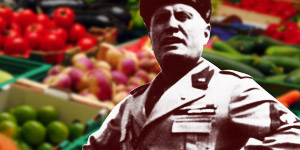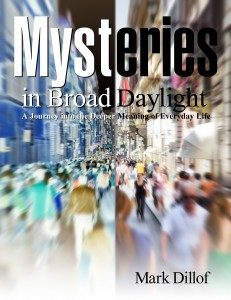“Life is a dream.” — Calderon
“History is a nightmare from which I am trying to awaken.” — James Joyce
Susan Boyle chose the perfect song for her Cinderella-like debut, on “Britain’s Got Talent.” Her rendition of “I Dreamed a Dream,” from the musical “Les Misérables,” instantly made her a symbol of hope for those longing to fulfill their dreams. “Never forsake your dreams” is the same message that has also launched the careers of thousands of motivational speakers, as well as a great many self-help books. The fact that she is frumpy looking and middle aged adds to the narrative of the ugly ducking making good.
But what exactly is the dreamlike image of happiness that Ms. Boyle evoked? What image of the good life did she conjure up? For some, it evokes the American dream of launching a successful business, of being one’s own boss, of having only oneself to answer to. For the aspiring singer, actor, artist, or writer, it evokes the hope that the world will recognize one’s artistry. There are many other possible dreams.
In truth, entrepreneurs have to answer to demanding customers, and very often to one’s partners, stockholders, board of directors, banker, accountant, lawyer, government regulators, suppliers, competitors, family members, etc. And those pursuing artistic endeavors often have to labor for years, if not all their life, at their day job, while working on one’s craft and auditioning during afterhours. But such negativities are not part of the dream. They’re the morning hangover after one starts awakening from the dream. All the same, there’s much to be said for having the courage to take risks, and of striving to improve our lot in life.
For many people, though, Susan Boyle’s famous performance does not evoke the American dream of hard work and achievement, but the Cinderella-like dream of simply being discovered, and the fortune and fame that will then follow. In point of fact, Susan Boyle labored hard at her craft, in obscurity, for many years, but that fact tends to be forgotten. As a way of getting clearer on the dream her song evoked, we may ask whether or not the good life depends on success, and, if so, what sort of success?
It’s been often said that a man is successful if he gets to do what loves doing. Is that true in the case of Susan Boyle? Prior to her meteoric rise to stardom, she did plenty of singing in her village in Scotland, both for her church and for various clubs. Apparently, that was not sufficient, or else she would not have auditioned for Simon Crowell’s TV show. What was lacking was fortune and world fame.
Here, again, there is certainly nothing objectionable with seeking to be well-known, but there is something more to the dream of fortune and fame. At its heart is the belief that the money and universal adulation will free us from the suffering intrinsic to the human condition. We need not have to deal with a demanding boss and difficult co-workers, nor need we wait on lines, nor live next to unpleasant neighbors, nor have to deal with any of the kicks and pricks to which most people find themselves subject. Implicit is the assumption that the winner of the singing competition will be allowed to go free, while the losers will be condemned to return to a wretched lives as wage slaves, having to defer their dream for another occasion.
What if Ms. Boyle had gone through life never having been discovered by the talent scout Simon Cowell? Does that mean that her life would have been a sad disappointment, if not a tragic failure? Would she have been akin to the protagonist of Hardy’s novel “Jude the Obscure”? If something doesn’t seem right with this picture, it’s because the dream of fame is a shallow one.
In point of fact, Susan the famous does not seem a whit happier than had been Susan the obscure. If anything she seems to have become quite miserable, exhausted, and suffering from a nervous breakdown. Then, again, all this shouldn’t come as a surprise to anyone familiar with the lives of many of the most popular singers, from Janis Joplin to Jim Morrison, from Elvis to Michael Jackson.
Perhaps, then, the problem lies with our dreams. In Mark Twain’s unfinished story “The Mysterious Stranger,” the sagacious Satan advises mankind to “Dream other dreams, and better!” Offhand, that seems like sound advice. Certainly, on the face of it, some dreams seem better than other dreams. After all, few would choose the life of poverty to the life of affluence. And there is much to be said for the dream of marriage and family. Furthermore, some dreams are more elevating than other dreams. The dream of serving God, by helping humanity, as did Albert Schweitzer and Mother Teresa, is a spiritually more uplifting dream than that of the dream of achieving fortune and fame. Then there are the imaginative dreams evoked by science fiction writers and the transcendent dreams of those exploring the higher reaches of human potential.
But, on the deepest level, every dream is still a dream. As an old song says, “It’s still the same old story, a fight for love and glory.” Here, again, there is much to be said for that dream, but, to quote the words from yet another song, “Is that all there is?” Is there another side to this life? We have elsewhere referred to the conservation of suffering principle. It states that our suffering will be equal no matter what our dream may be. The particular form that suffering takes will change but the quantity of suffering remains the same. That is why it is always foolish to envy the lives of other people.
What, then, is the alternative to dreaming? It’s certainly not “shrinking,” i.e., a dreary acceptance of a mundane life. The real alternative is waking-up. That life is essentially a dream and that we can awaken from it is the perennial wisdom of the ages. For example, Plato’s “Allegory of the Cave” is about leaving the cave of dreams. (The popular film “The Matrix” has that same theme. Similarly, the notion of awakening from a long dream lies at heart of Eastern religions, like Hinduism and Buddhism.
The purpose of these short essays, or blog posts, has been to examine the warp and woof of this dream we call life, with the intent of awakening from it. Bearing all this in mind, let us hope that Ms. Boyle, comes to her senses and finds a new song to sing, perhaps one with a title like “I Awoke from a Dream.”



